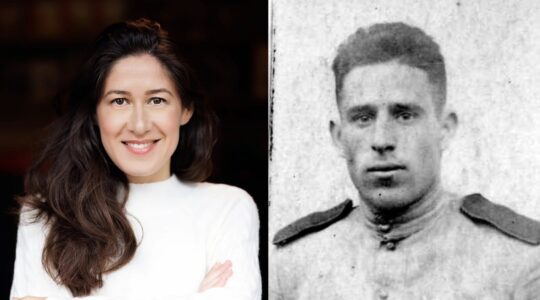Candlelighting, Readings:
Shabbat Candles: 4:10 p.m.
Torah: Genesis 28:10-32:3
Haftarah: Hosea 11:7-12:12 (Sephard); 12:13-14:10 (Ashkenaz)
Havdalah: 5:11 p.m.
Jacob is a man on the move. With Esau threatening to kill Jacob for taking the blessing intended for Esau, their mother Rebecca tells Jacob to seek refuge with Uncle Lavan in Haran. And so, Jacob leaves his homeland, his birthplace, his family. Abraham was commanded to “lech lecha,” to leave everything behind, to go to the Promised Land, and in so doing go “into” himself to discover who he is. But for Jacob, unlike the “lech lecha” of his grandfather, he leaves uncertain as to where it will take him.
Jacob is a man defined by his struggles. As Rabbi Jonathan Sacks explains, while Abraham and Isaac represent modes of being, Jacob stands for “becoming.” He is a “beinoni, someone in the middle,”s in “liminal space” between the home he is escaping and the destination he has not yet reached. Vulnerability and uncertainty loom large. Picture the scene as Vayeitzei begins: Jacob is alone, at night, outdoors, in an atmosphere of uncertainty and foreboding. He has no shelter, no bed, stones instead of a pillow. He lies down in the open field, dreaming of a ladder going from earth to heaven, with angels going up and coming down. God appears in the dream and promises to guard Jacob on his travels and return him to Canaan (Israel). Jacob awakes with a start, declaring “God was in this place and I never knew it!” He names this holy place Beit El and promises to show obedience to God in return for continued Divine protection.
It soon becomes apparent that Jacob is the prime example of not only the first Jew in Galut (exile), and the first “modern” Jew in the Torah. He doesn’t expect, given his family’s stature and Divine promises, that he will need to flee. He assumes he has “arrived” on the shoulders of those that came before to a “right place.” But he must start all over. Alone, out of his comfort zone, he must build his life and a connection to his heritage on his own, in a foreign place and environment. He doesn’t have his parents, only Lavan, a poor role model.
As we see Jacob encountering Lavan, one almost wants to scream out, watch your back! As even the haggadah says, Lavan was even worse than Pharaoh. As Rabbi Simcha Lyons explains, Pharaoh sought to destroy the first born; Lavan sought to “la’aker et hakol,” to uproot everything through deceit. By switching Leah for Rachel, he knew his actions would affect not only a few individuals but create family discord lasting forever.
The challenges Jacob faces in the House of Lavan foretell the trajectory of his life, represented by the ladder in his dream. He may have “miles to go before he sleeps” soundly again. He may be forced to start on the bottom rung, but the ladder should alert him to his potential for achieving great things in his life. The rabbis explain that the gematria (numerology) of the word “sulam” (ladder) can mean either money or Sinai. The ladder that God has set for Jacob can be used to either achieve great materialistic things or great spiritual seeking.
Immediately upon waking, he seems to err on the side of seeking material things from God. Reminiscent of the Jewish immigrants drawn to America as the place “paved with gold,” those immigrants rather quickly were faced with not only how to make a living but how to continue to be connected to their Jewish identity and heritage. At the end of Vayeitzei, Jacob will realize that despite living with Lavan for many years and amassing a fortune, Jacob, says Rashi, never forgot the “taryag (613) mitzvot,” and Jewish tradition, continuity, and values. The dream at the opening of Vayeitzei will always be a reminder that, as he seeks material wealth, he also has to be “ma’alim b’kodesh,” he has to go up in holiness to achieve his true spiritual destiny.
Jacob recognizes that the place where he has bedded down for the night has intrinsic sanctity, representing Jerusalem and Har HaMoriah (the future Temple Mount), the very place where his father Isaac was nearly sacrificed. All places in the world may reflect God’s sanctity but this place is uniquely so, reminding him that he can’t let the legacy he was given pass him by. God has promised to protect him and reward him. Jacob is now empowered against the dangers of the night. Dawn has broken. To paraphrase the Psalmist, at night we must have faith in Hashem but by morning as we face a new day we recognize God’s grace and the power to go on.
For Jacob, the journey to God’s promises has only just begun. As he ascends the ladder of life, building a new home and forging a greater connection to God, he will encounter many forces that will seek to keep him at a lower rung. His story gives us all hope that whatever we encounter, God is always with us. We pray that like our forefather Jacob, God give us the courage to always persevere against any darkness that we may face along the journeys of our life.
Dr. Adena Berkowitz is scholar-in-residence at Kol HaNeshamah, co-author of “Shaarei Simcha-Gates of Joy” and a visiting lecturor at Yeshivat Chovevei Torah rabbinical school.
The New York Jewish Week brings you the stories behind the headlines, keeping you connected to Jewish life in New York. Help sustain the reporting you trust by donating today.




